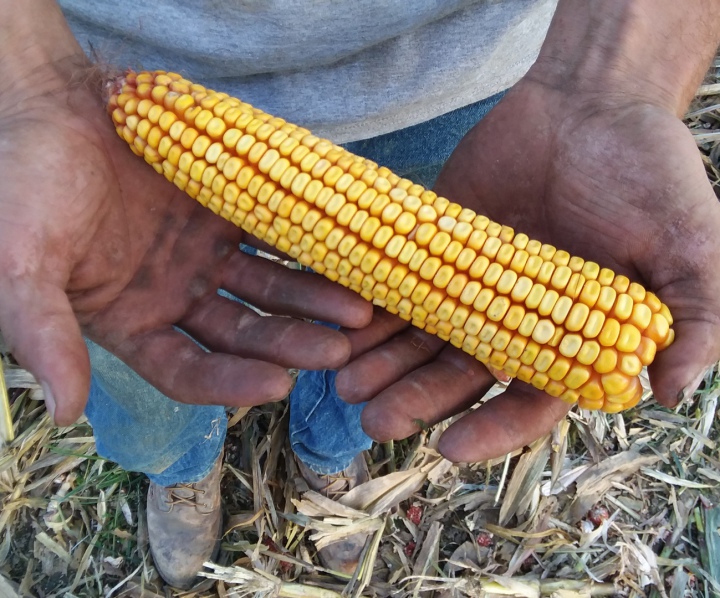As a farmer, you work from dawn to dusk. You plan. You budget. You worry. You sweat. You hope. You pray. And yet, one stroke of a pen in Washington, DC can do as much to make or break your profitability as the thousands of hours you devote to your crop each season.
News from NCGA
Corn Growers Applaud EPA for Allowing Access to Higher Blends of Ethanol During Summer Months (Fri, 19 Apr 2024)
 The U.S. Environmental Protection Agency announced today that it will use its existing authority to prevent drivers from losing access to lower-cost and lower-emission E15, a higher ethanol blend
often marketed as Unleaded 88.
The National
Corn Growers Association (NCGA) and state corn grower organizations, which have advocated for the move, praised the decision
“This waiver is good news for corn growers and those in rural America who will benefit economically from this decision and for consumers who will save money at the pump during a busy travel season,”
said Minnesota farmer and NCGA President Harold Wolle. “We are deeply appreciative of EPA Administrator Regan, President Biden and our congressional allies for all their work on this issue.”
Under current policy, E15 cannot be sold at terminals beginning on May 1 and at retail stations starting on June 1. But the Clean Air Act gives EPA authority to temporarily waive these requirements
to address pressing concerns, such as fuel shortages.
The war in Ukraine, disruptions to key trade routes and inflation have raised concerns among many in the Biden administration and in Congress about high gas prices and energy security.
Higher blends of ethanol have been shown to significantly reduce greenhouse gas emissions while lowering the price of fuels and the biofuels reduce America’s need for foreign oil.
In February, EPA approved a petition from eight Midwestern governors allowing their states to sell E15. But since that decision is not effective until summer 2025 and only impacts a handful of
states, corn grower leaders had to quickly mobilize and work with EPA to get today’s waiver in motion.
NCGA is working with allies, including the petroleum industry, on federal legislation that would provide permanent, year-round access to E15.
The U.S. Environmental Protection Agency announced today that it will use its existing authority to prevent drivers from losing access to lower-cost and lower-emission E15, a higher ethanol blend
often marketed as Unleaded 88.
The National
Corn Growers Association (NCGA) and state corn grower organizations, which have advocated for the move, praised the decision
“This waiver is good news for corn growers and those in rural America who will benefit economically from this decision and for consumers who will save money at the pump during a busy travel season,”
said Minnesota farmer and NCGA President Harold Wolle. “We are deeply appreciative of EPA Administrator Regan, President Biden and our congressional allies for all their work on this issue.”
Under current policy, E15 cannot be sold at terminals beginning on May 1 and at retail stations starting on June 1. But the Clean Air Act gives EPA authority to temporarily waive these requirements
to address pressing concerns, such as fuel shortages.
The war in Ukraine, disruptions to key trade routes and inflation have raised concerns among many in the Biden administration and in Congress about high gas prices and energy security.
Higher blends of ethanol have been shown to significantly reduce greenhouse gas emissions while lowering the price of fuels and the biofuels reduce America’s need for foreign oil.
In February, EPA approved a petition from eight Midwestern governors allowing their states to sell E15. But since that decision is not effective until summer 2025 and only impacts a handful of
states, corn grower leaders had to quickly mobilize and work with EPA to get today’s waiver in motion.
NCGA is working with allies, including the petroleum industry, on federal legislation that would provide permanent, year-round access to E15.
>> Read more
Six National Commodity Groups Call on U.S. International Trade Commission to Nix Petition Related to Duties on Herbicides (Thu, 18 Apr 2024)
 Six of the nation’s major commodity groups, including the National Corn Growers Association, sent a letter to the U.S.
International Trade Commission today encouraging it to vote negative in advancing a petition by Corteva Agribusiness to place antidumping and countervailing duties on imports of the herbicide 2,4-D
shipped from India and China.
The letter said if the U.S. International Trade Commission votes to continue the case beyond the preliminary stage, farmers across the country could soon find it difficult to access critical
supplies.
The letter, signed by leaders from the American Soybean Association, National Association of Wheat Growers, National Barley Growers Association, National Corn Growers Association, National Sorghum
Producers and the U.S. Durum Growers Association, expressed concerns that the petition could hinder imports and cause herbicide shortages.
“The imports covered by this case are the large majority of sources of supply other than Corteva, which is the only U.S. supplier,” the letter said. “To put it simply, America’s farmers cannot
rely upon a sole domestic supplier of 2,4-D to meet nearly all the market’s needs, and imports are needed to meet the majority of market needs.”
Duties on 2,4-D imports from the two countries would intensify what is already a difficult period for many growers as key input costs continue to increase.
The U.S. Department of Agriculture is projecting record high farm production cash expenses for 2024. At the same time, crop values are declining. USDA projects total cash receipts for crops in
2024 will be 11.7% lower than 2022.
The letter noted that the petition, which seeks to limit imports of a critical farm input, only makes a rough environment even more challenging.
“There is no way for farmers to make up for the additional costs, as we are price takers, not makers, in selling crops,” the leaders said. “If this case moves forward, we will be forced to make
budget cuts that can impact our operations as well as our local economies. To put it simply, the weight of a dispute between multinational companies would fall directly on the shoulders of
growers.”
The ITC is scheduled to vote on its preliminary determination in this case on May 17, 2024.
READ THE LETTER
Six of the nation’s major commodity groups, including the National Corn Growers Association, sent a letter to the U.S.
International Trade Commission today encouraging it to vote negative in advancing a petition by Corteva Agribusiness to place antidumping and countervailing duties on imports of the herbicide 2,4-D
shipped from India and China.
The letter said if the U.S. International Trade Commission votes to continue the case beyond the preliminary stage, farmers across the country could soon find it difficult to access critical
supplies.
The letter, signed by leaders from the American Soybean Association, National Association of Wheat Growers, National Barley Growers Association, National Corn Growers Association, National Sorghum
Producers and the U.S. Durum Growers Association, expressed concerns that the petition could hinder imports and cause herbicide shortages.
“The imports covered by this case are the large majority of sources of supply other than Corteva, which is the only U.S. supplier,” the letter said. “To put it simply, America’s farmers cannot
rely upon a sole domestic supplier of 2,4-D to meet nearly all the market’s needs, and imports are needed to meet the majority of market needs.”
Duties on 2,4-D imports from the two countries would intensify what is already a difficult period for many growers as key input costs continue to increase.
The U.S. Department of Agriculture is projecting record high farm production cash expenses for 2024. At the same time, crop values are declining. USDA projects total cash receipts for crops in
2024 will be 11.7% lower than 2022.
The letter noted that the petition, which seeks to limit imports of a critical farm input, only makes a rough environment even more challenging.
“There is no way for farmers to make up for the additional costs, as we are price takers, not makers, in selling crops,” the leaders said. “If this case moves forward, we will be forced to make
budget cuts that can impact our operations as well as our local economies. To put it simply, the weight of a dispute between multinational companies would fall directly on the shoulders of
growers.”
The ITC is scheduled to vote on its preliminary determination in this case on May 17, 2024.
READ THE LETTER
>> Read more
 The U.S. Environmental Protection Agency announced today that it will use its existing authority to prevent drivers from losing access to lower-cost and lower-emission E15, a higher ethanol blend
often marketed as Unleaded 88.
The National
Corn Growers Association (NCGA) and state corn grower organizations, which have advocated for the move, praised the decision
“This waiver is good news for corn growers and those in rural America who will benefit economically from this decision and for consumers who will save money at the pump during a busy travel season,”
said Minnesota farmer and NCGA President Harold Wolle. “We are deeply appreciative of EPA Administrator Regan, President Biden and our congressional allies for all their work on this issue.”
Under current policy, E15 cannot be sold at terminals beginning on May 1 and at retail stations starting on June 1. But the Clean Air Act gives EPA authority to temporarily waive these requirements
to address pressing concerns, such as fuel shortages.
The war in Ukraine, disruptions to key trade routes and inflation have raised concerns among many in the Biden administration and in Congress about high gas prices and energy security.
Higher blends of ethanol have been shown to significantly reduce greenhouse gas emissions while lowering the price of fuels and the biofuels reduce America’s need for foreign oil.
In February, EPA approved a petition from eight Midwestern governors allowing their states to sell E15. But since that decision is not effective until summer 2025 and only impacts a handful of
states, corn grower leaders had to quickly mobilize and work with EPA to get today’s waiver in motion.
NCGA is working with allies, including the petroleum industry, on federal legislation that would provide permanent, year-round access to E15.
The U.S. Environmental Protection Agency announced today that it will use its existing authority to prevent drivers from losing access to lower-cost and lower-emission E15, a higher ethanol blend
often marketed as Unleaded 88.
The National
Corn Growers Association (NCGA) and state corn grower organizations, which have advocated for the move, praised the decision
“This waiver is good news for corn growers and those in rural America who will benefit economically from this decision and for consumers who will save money at the pump during a busy travel season,”
said Minnesota farmer and NCGA President Harold Wolle. “We are deeply appreciative of EPA Administrator Regan, President Biden and our congressional allies for all their work on this issue.”
Under current policy, E15 cannot be sold at terminals beginning on May 1 and at retail stations starting on June 1. But the Clean Air Act gives EPA authority to temporarily waive these requirements
to address pressing concerns, such as fuel shortages.
The war in Ukraine, disruptions to key trade routes and inflation have raised concerns among many in the Biden administration and in Congress about high gas prices and energy security.
Higher blends of ethanol have been shown to significantly reduce greenhouse gas emissions while lowering the price of fuels and the biofuels reduce America’s need for foreign oil.
In February, EPA approved a petition from eight Midwestern governors allowing their states to sell E15. But since that decision is not effective until summer 2025 and only impacts a handful of
states, corn grower leaders had to quickly mobilize and work with EPA to get today’s waiver in motion.
NCGA is working with allies, including the petroleum industry, on federal legislation that would provide permanent, year-round access to E15.
>> Read more
Six National Commodity Groups Call on U.S. International Trade Commission to Nix Petition Related to Duties on Herbicides (Thu, 18 Apr 2024)
 Six of the nation’s major commodity groups, including the National Corn Growers Association, sent a letter to the U.S.
International Trade Commission today encouraging it to vote negative in advancing a petition by Corteva Agribusiness to place antidumping and countervailing duties on imports of the herbicide 2,4-D
shipped from India and China.
The letter said if the U.S. International Trade Commission votes to continue the case beyond the preliminary stage, farmers across the country could soon find it difficult to access critical
supplies.
The letter, signed by leaders from the American Soybean Association, National Association of Wheat Growers, National Barley Growers Association, National Corn Growers Association, National Sorghum
Producers and the U.S. Durum Growers Association, expressed concerns that the petition could hinder imports and cause herbicide shortages.
“The imports covered by this case are the large majority of sources of supply other than Corteva, which is the only U.S. supplier,” the letter said. “To put it simply, America’s farmers cannot
rely upon a sole domestic supplier of 2,4-D to meet nearly all the market’s needs, and imports are needed to meet the majority of market needs.”
Duties on 2,4-D imports from the two countries would intensify what is already a difficult period for many growers as key input costs continue to increase.
The U.S. Department of Agriculture is projecting record high farm production cash expenses for 2024. At the same time, crop values are declining. USDA projects total cash receipts for crops in
2024 will be 11.7% lower than 2022.
The letter noted that the petition, which seeks to limit imports of a critical farm input, only makes a rough environment even more challenging.
“There is no way for farmers to make up for the additional costs, as we are price takers, not makers, in selling crops,” the leaders said. “If this case moves forward, we will be forced to make
budget cuts that can impact our operations as well as our local economies. To put it simply, the weight of a dispute between multinational companies would fall directly on the shoulders of
growers.”
The ITC is scheduled to vote on its preliminary determination in this case on May 17, 2024.
READ THE LETTER
Six of the nation’s major commodity groups, including the National Corn Growers Association, sent a letter to the U.S.
International Trade Commission today encouraging it to vote negative in advancing a petition by Corteva Agribusiness to place antidumping and countervailing duties on imports of the herbicide 2,4-D
shipped from India and China.
The letter said if the U.S. International Trade Commission votes to continue the case beyond the preliminary stage, farmers across the country could soon find it difficult to access critical
supplies.
The letter, signed by leaders from the American Soybean Association, National Association of Wheat Growers, National Barley Growers Association, National Corn Growers Association, National Sorghum
Producers and the U.S. Durum Growers Association, expressed concerns that the petition could hinder imports and cause herbicide shortages.
“The imports covered by this case are the large majority of sources of supply other than Corteva, which is the only U.S. supplier,” the letter said. “To put it simply, America’s farmers cannot
rely upon a sole domestic supplier of 2,4-D to meet nearly all the market’s needs, and imports are needed to meet the majority of market needs.”
Duties on 2,4-D imports from the two countries would intensify what is already a difficult period for many growers as key input costs continue to increase.
The U.S. Department of Agriculture is projecting record high farm production cash expenses for 2024. At the same time, crop values are declining. USDA projects total cash receipts for crops in
2024 will be 11.7% lower than 2022.
The letter noted that the petition, which seeks to limit imports of a critical farm input, only makes a rough environment even more challenging.
“There is no way for farmers to make up for the additional costs, as we are price takers, not makers, in selling crops,” the leaders said. “If this case moves forward, we will be forced to make
budget cuts that can impact our operations as well as our local economies. To put it simply, the weight of a dispute between multinational companies would fall directly on the shoulders of
growers.”
The ITC is scheduled to vote on its preliminary determination in this case on May 17, 2024.
READ THE LETTER
>> Read more






